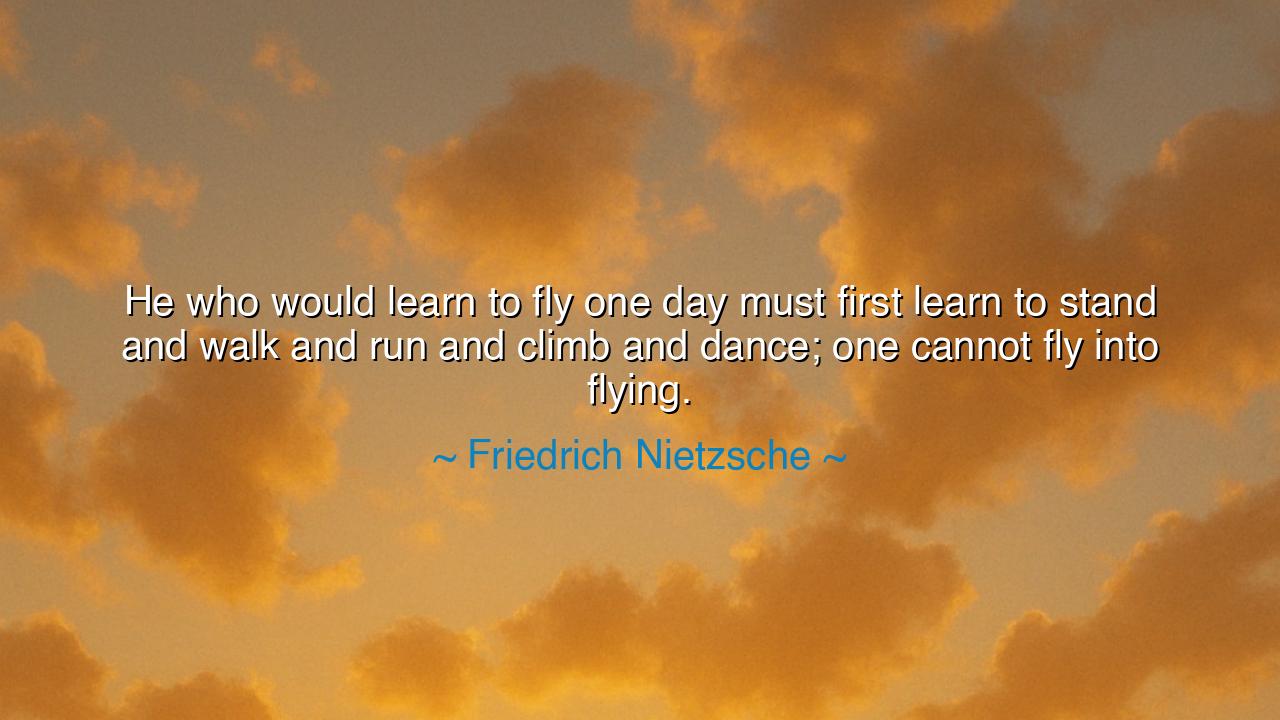
He who would learn to fly one day must first learn to stand and
He who would learn to fly one day must first learn to stand and walk and run and climb and dance; one cannot fly into flying.






The philosopher Friedrich Nietzsche, that fierce spirit who sought to awaken humanity from its slumber, once proclaimed: “He who would learn to fly one day must first learn to stand and walk and run and climb and dance; one cannot fly into flying.” These words, poetic and eternal, speak to the sacred order of growth—the discipline of becoming. Nietzsche, who wrote of the will to power and the rise of the Übermensch, teaches here that greatness is not born in a moment of glory, but in the long, patient struggle that precedes it. The wings of mastery are earned, not granted.
To fly, in the soul’s sense, is to rise above the ordinary—to reach the heights of wisdom, art, or courage. Yet no man, however bold, can leap into the heavens without first mastering the ground. Standing is stability, walking is persistence, running is energy, climbing is aspiration, and dancing—ah, dancing—is the joyous mastery of all that came before. Each stage builds upon the last; each movement prepares the spirit for the next. Nietzsche reminds us that we cannot skip the journey of growth. To try to fly into flying is to seek greatness without foundation, to crave the crown without the trials that make one worthy of it.
In his time, Nietzsche watched a world eager for progress yet unwilling to labor for it. He saw men grasping for enlightenment without study, artists craving brilliance without discipline, and souls demanding transcendence without struggle. Against this folly he raised his voice. For he knew that even the eagle, that king of the sky, was once a trembling fledgling. Before it soared above mountains, it learned balance upon the branch, strength in its wings, and courage in its heart. The same law governs all creation: growth is the price of greatness.
Consider the story of Leonardo da Vinci, the universal man. Before he painted the Mona Lisa, he spent years sketching bones, studying light, dissecting muscles, and learning the patterns of flight from the wings of birds. Before he could fly, he learned to walk through endless observation and patience. He mastered every earthly detail so that his visions might one day ascend to the heavens. His genius was not divine chance—it was the fruit of persistence, of a thousand careful steps toward mastery. Thus Leonardo, like Nietzsche’s philosopher, shows us that one must first conquer the simple before commanding the sublime.
The ancients, too, understood this truth. In the training halls of Greece, young athletes were not thrown into battle or competition at once. They were taught the rhythm of movement, the harmony of the body, the endurance of the spirit. The philosopher Plato himself declared that the education of the soul must begin with music and gymnastics—the art of harmony and the discipline of effort. Only after these could the mind ascend to philosophy, to the higher flight of thought. Even the gods, it was said, required preparation before glory. Every ascent begins in humility.
To climb and to dance—these images Nietzsche chose with purpose. For climbing is struggle—the exertion of will against resistance, the hand grasping for higher ground. Dancing, on the other hand, is mastery made graceful; it is when strength becomes beauty, when discipline turns into art. One cannot dance before learning to climb; one cannot fly before learning to dance. The flight Nietzsche speaks of is not physical—it is the flight of the spirit, of creation, of enlightenment. To fly into flying is to desire the final joy without the sacred suffering that gives it meaning.
Yet there is mercy and hope in Nietzsche’s words. For though the path is long, each stage holds its own beauty. To stand is to awaken; to walk is to begin the journey; to run is to feel power surge through one’s being; to climb is to conquer fear; and to dance is to taste the divine. The wings of flight are not separate from these—they are the culmination of them. The lesson is clear: do not despise small beginnings, nor grow impatient with progress. Every motion, every effort, every failure is part of your ascent.
So let this be your lesson, seeker of heights: embrace the stages of your becoming. Do not crave the sky before you have learned the ground. Study, practice, stumble, rise again. Build strength in your heart, grace in your hands, and courage in your soul. Do not fear slow growth; fear only standing still. For one day, after much toil, the steps that once burdened you will become the rhythm of your wings. And then, when you have learned to walk, to run, to climb, and to dance—you shall fly, not by chance, but by destiny.






AAdministratorAdministrator
Welcome, honored guests. Please leave a comment, we will respond soon